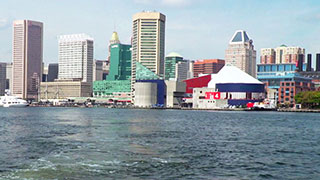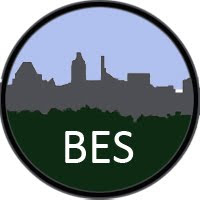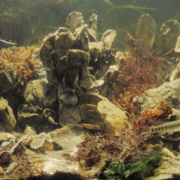BES Breakdowns – Take a dive into a recent scientific paper
‘Towards an urban marine ecology: characterizing the drivers, patterns and processes of marine ecosystems in coastal cities’
by Peter A. Todd, Eliza C. Heery, Lynette H. L. Loke, Ruth H. Thurstan, D. Johan Kotze, and Christopher Swan
Urban ecology explores the effects of our activities on ecological processes. Urban ecologists work to connect this understanding with city residents, developers, and decision-makers – to guide actions that support the needs of people and the environment.
The near-marine environments of coastal cities are an understudied – and increasingly important – component of the urban landscape. Coastal cities are rapidly growing hubs of development and home to a majority of the world’s population. These environments experience intense pressures from human activities, both on land and in the water. Plants and animals living in marine communities are undergoing significant changes, as are the ecosystem services that they provide. Yet, there is much to discover about the drivers impacting these systems, and what these changes could mean for humans and biological communities in the future.
‘Towards an urban marine ecology: characterizing the drivers, patterns and processes of marine ecosystems in coastal cities’ is a new paper, recently published in Oikos by Todd et al. The review aims to lay the groundwork for the nascent field of urban marine ecology – an ambitious undertaking. We interviewed coauthor and Baltimore Ecosystem Study (BES) co-PI Christopher Swan to tell us about how the survey came together and how this type of research could apply to Baltimore.
Swan notes that this is an important paper because it outlines what is known about the effects of coastal development on ecological communities. Plus, the 13 pages of citations could serve as a ‘toolbox’ of relevant literature to inform future work. “I hope researchers use this paper as a resource to guide further studies looking at the ecology of urban coastal waters. We need to fill knowledge gaps concerning (a) how urban places change over time, and (b) how these changes interact with climate change impacts affecting coastal waters.”
In the Baltimore region, the water quality of the harbor and the Chesapeake Bay are of major concern to citizens, businesses, and elected officials. We see the effects of human activity in watersheds draining into the harbor in the form of high nutrient and pollutant loads. Shoreline ‘hardening’ – when structures made of rock, concrete, and steel are built in coastal zones – makes it easier for pollutants to flow into waterways and changes the types of surfaces available for marine organisms to live and grow upon. Poor water quality and the introduction of artificial materials to these environments can decrease the numbers and types of native organisms and have other negative impacts. This, in turn, hurts the local economy with declining oyster and crab harvests and diminished recreational opportunities.

the Baltimore Harbor
With its many interested stakeholders, Baltimore is primed for the type of planning that the paper explores. A key point: “All sides of coastal city design…will need to prioritize the marine environment if negative effects of urbanization are to be minimized.”
Swan says, “Baltimore would be a productive research site for the avenues of study suggested in this paper. BES LTER researchers and others have been collecting data in the area for decades, including data on pollutants flowing into the harbor. ” While BES has focused on Baltimore’s freshwaters, all of the work on water quality has direct implications for Baltimore’s urban-marine interface. Researchers have built a trove of data supported by a network of scientists, decision-makers, designers, and community groups. He adds, “This knowledge base could be an important tool for future studies. We are poised to connect what is known – and perhaps uncover what needs to be known – about the ecological communities in Baltimore’s coastal waters.”
For urban marine research in Baltimore and other coastal cities, this new paper could support those grappling with related questions, help organize new investigations, and frame proposed research.
Finally, a look into the process of putting it all together:
Christopher Swan came to be involved with the review as a subject editor for the journal Oikos. Back in early 2017, the editor-in-chief asked select subject editors to spearhead efforts in their areas of expertise for Forum pieces. Forum pieces receive high visibility and readership and Chris was asked to take on the topic of urbanization at the coastlines. A core group was organized – Peter Todd, one of the leading experts in the field, Johan Kotze, and Dr. Swan – and the paper developed from there.
Conference calls between the three researchers based in Singapore, Finland and Baltimore, MD respectively took place over a two-year period to develop a detailed outline. Dr. Swan then gave an invited lecture at the 2018 Nordic Ecological Society meeting in Norway. This talk was followed by a review, spearheaded by Dr. Todd and his colleagues, which ultimately culminated in the paper.
To learn more, you can access the paper here.
Sources:
URL: http://urbanmarineecology.org/, accessed 08.05.2019
URL: https://www.cell.com/trends/ecology-evolution/fulltext/S0169-5347(06)00297-7, accessed 08.05.2019
Christopher Swan. Personal interview: 4 August 2019.





